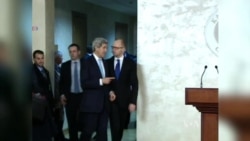U.S. Secretary of State John Kerry said the United States, while seeking a diplomatic solution to the conflict in eastern Ukraine, would not "close our eyes" to Russian tanks and fighters crossing the border.
Kerry said he and Ukraine President Petro Poroshenko discussed issues including Russia's continued aggression during a meeting Thursday.
“We talked about the largest threat that Ukraine faces today, and that is Russia's continued aggression in the east. There's no other way to call it,” Kerry told reporters.
"We can't close our eyes to tanks coming across the border" or to "Russian fighters coming across the border," he said.
The top U.S. diplomat said no one is "seeking a conflict with Russia" and that he was hopeful that Russia would take advantage of broad-based, uniform acceptance of the fact that there can be a diplomatic resolution.
‘Choice is diplomacy’
At a joint news conference after talks in Kyiv with Poroshenko, Kerry urged Russia to show its commitment to a peaceful, diplomatic solution to the conflict in eastern Ukraine by ceasing its military support for the separatists and bringing them to the negotiation table.
"Our choice is diplomacy," Kerry said, adding a review is underway regarding a possible U.S. decision to supply Ukraine with lethal military aid.
Calling it a "very critical moment in our history," Poroshenko said Ukraine appreciates U.S. support and is grateful for the "consistent engagement" of the U.S. State Department, which has become more important because of Russia's actions.
The United States and its allies accuse Russia of supporting separatists in eastern Ukraine with weapons and manpower, a charge Moscow denies.
Kerry also met with Ukraine's prime minister later Thursday. Speaking at a separate news conference with Arseniy Yatsenyuk, Kerry said it was up to Russian President Vladimir Putin to "make the choices that could end this war."
Yatsenyuk called on Russia to implement the Minsk agreement, signed five months ago, adding that Ukraine will not agree to any peace plan "that undermines the territorial integrity, sovereignty, independence of Ukraine and its European future."
'New solution'
Meanwhile, French President Francois Hollande and German Chancellor Angela Merkel offered what Hollande called a "new solution to the conflict based on [preserving] the territorial integrity of Ukraine."
Hollande and Merkel presented the plan to Poroshenko during a joint trip to Kyiv before heading to Moscow Friday for talks with Russian President Vladimir Putin.
No details of the peace initiative were immediately available.
Kerry, who does not plan to go to Moscow, said he has not yet thoroughly reviewed the Franco-German proposal, but said it shows the U.S. and its international partners stand united in urging Russia to end its role in the conflict.
He said he had a chance to "coordinate diplomacy" with Hollande and Merkel and supports their efforts in Moscow.
As the Europe's key mediator on Ukraine, Merkel has spoken to Putin more than 40 times in the past year, but Friday will be the first time during the crisis that she has gone to Moscow.
Russian President Vladimir Putin's top foreign policy adviser called the meeting planned for Friday between the Russian, French and German leaders a "positive step" and said Putin is ready to hold "constructive" talks.
Yury Ushakov said he hoped the plan put forward by Hollande and Merkel would take into account the "numerous proposals" put forward earlier by Putin.
A Western diplomat said a new Russian proposal for Ukraine, presented by Moscow to France and Germany, "is not a peace plan. It is a roadmap to creating a new Transnistria or Abkhazia in Ukraine. It is a cynical effort to get out of all the commitments made in Minsk."
Chancellor Merkel travels to Washington on Sunday for talks with President Barack Obama. The White House says Ukraine will be among the items topping their agenda.
US considers supplying arms
The Franco-German bid appeared designed to head off U.S. considerations of providing Ukraine with defensive weapons, a move Europeans oppose out of fear of provoking Russia and further escalating tensions.
As the Obama administration is still reviewing its options, a now Republican-controlled Congress is now upping the pressure. Lawmakers will write legislation requiring the U.S. to send arms to Ukraine if President Barack Obama does not move to send weapons, Republican Senator John McCain said on Thursday.
McCain led a group of Republican and Democratic senators at a news conference in pressing Obama to send arms to help Kyiv defend itself.
Washington has provided Ukraine with over $355 million in assistance over the past year, but has so far been reluctant to provide lethal aid.
Ukraine's Poroshenko has also called on NATO to provide Kyiv with more support, including modern weapons.
On the ground
The diplomatic push comes as fighting raged in and around the separatist-controlled areas within Ukraine's Donetsk and Luhansk regions, near the Russian border, especially near the twown of Debaltseve, a strategic transport hub.
In Kyiv, a Ukrainian military spokesman said Thursday five soldiers had been killed and 29 wounded in the past 24 hours. Troops had fended off two attempts to storm Debaltseve, the military said.
Earlier this week, the United Nations said nearly 5,400 people have been killed and more than 12,000 others wounded since separatists launched their rebellion last April, following Russia's annexation of Ukraine's Crimean Peninsula.
Just before Kerry's arrival in Kyiv, a senior State Department official announced the U.S. would provide Ukraine with an additional $16.4 million in aid to help civilians affected by the fighting in the country's east.
Pam Dockins contributed to this report from Kyiv. Carla Babb contributed from Brussels. Some material came from Reuters and AP.






